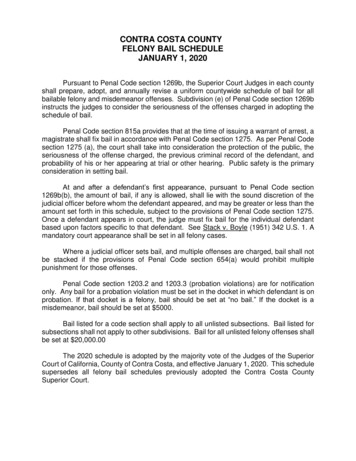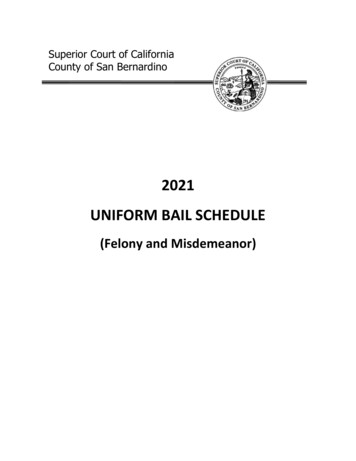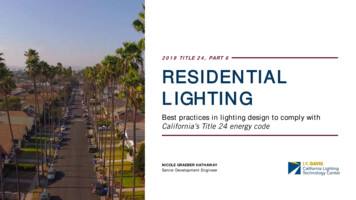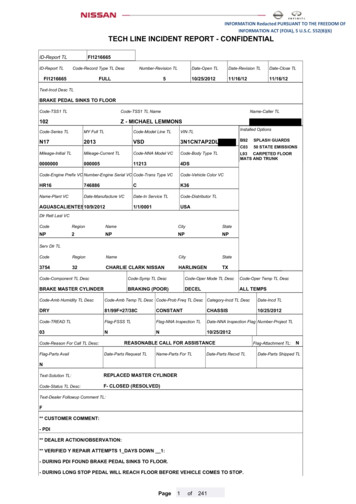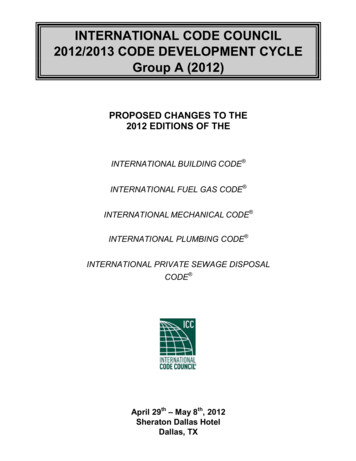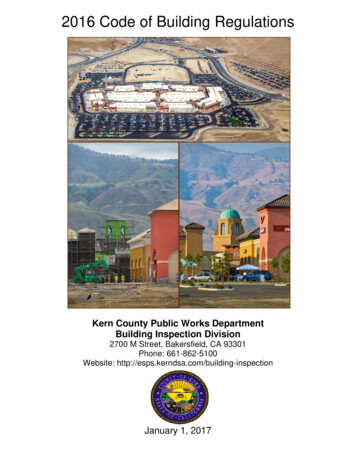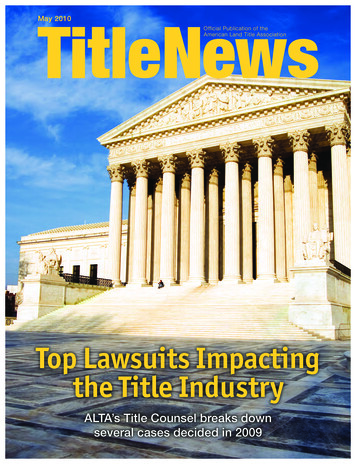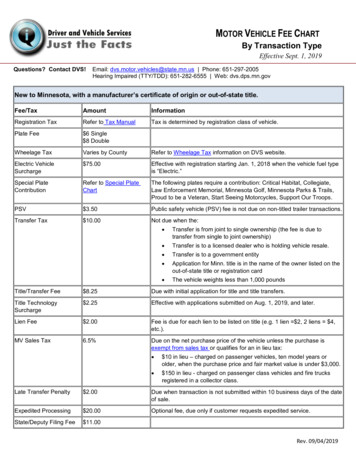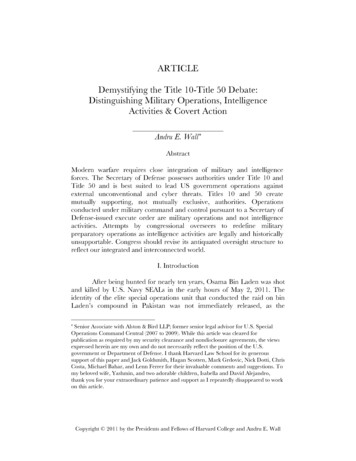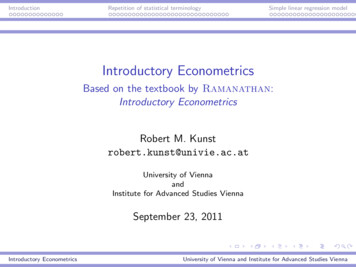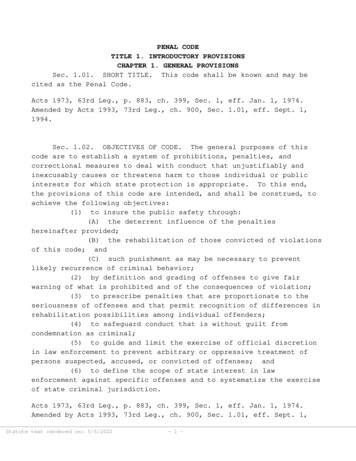
Transcription
PENAL CODETITLE 1. INTRODUCTORY PROVISIONSCHAPTER 1. GENERAL PROVISIONSSec. 1.01. SHORT TITLE. This code shall be known and may becited as the Penal Code.Acts 1973, 63rd Leg., p. 883, ch. 399, Sec. 1, eff. Jan. 1, 1974.Amended by Acts 1993, 73rd Leg., ch. 900, Sec. 1.01, eff. Sept. 1,1994.Sec. 1.02. OBJECTIVES OF CODE. The general purposes of thiscode are to establish a system of prohibitions, penalties, andcorrectional measures to deal with conduct that unjustifiably andinexcusably causes or threatens harm to those individual or publicinterests for which state protection is appropriate. To this end,the provisions of this code are intended, and shall be construed, toachieve the following objectives:(1) to insure the public safety through:(A) the deterrent influence of the penaltieshereinafter provided;(B) the rehabilitation of those convicted of violationsof this code; and(C) such punishment as may be necessary to preventlikely recurrence of criminal behavior;(2) by definition and grading of offenses to give fairwarning of what is prohibited and of the consequences of violation;(3) to prescribe penalties that are proportionate to theseriousness of offenses and that permit recognition of differences inrehabilitation possibilities among individual offenders;(4) to safeguard conduct that is without guilt fromcondemnation as criminal;(5) to guide and limit the exercise of official discretionin law enforcement to prevent arbitrary or oppressive treatment ofpersons suspected, accused, or convicted of offenses; and(6) to define the scope of state interest in lawenforcement against specific offenses and to systematize the exerciseof state criminal jurisdiction.Acts 1973, 63rd Leg., p. 883, ch. 399, Sec. 1, eff. Jan. 1, 1974.Amended by Acts 1993, 73rd Leg., ch. 900, Sec. 1.01, eff. Sept. 1,Statute text rendered on: 5/5/2022- 1 -
PENAL CODE1994.Sec. 1.03. EFFECT OF CODE. (a) Conduct does not constitute anoffense unless it is defined as an offense by statute, municipalordinance, order of a county commissioners court, or rule authorizedby and lawfully adopted under a statute.(b) The provisions of Titles 1, 2, and 3 apply to offensesdefined by other laws, unless the statute defining the offenseprovides otherwise; however, the punishment affixed to an offensedefined outside this code shall be applicable unless the punishmentis classified in accordance with this code.(c) This code does not bar, suspend, or otherwise affect aright or liability to damages, penalty, forfeiture, or other remedyauthorized by law to be recovered or enforced in a civil suit forconduct this code defines as an offense, and the civil injury is notmerged in the offense.Acts 1973, 63rd Leg., p. 883, ch. 399, Sec. 1, eff. Jan. 1, 1974.Amended by Acts 1993, 73rd Leg., ch. 900, Sec. 1.01, eff. Sept. 1,1994.Sec. 1.04. TERRITORIAL JURISDICTION. (a) This state hasjurisdiction over an offense that a person commits by his own conductor the conduct of another for which he is criminally responsible if:(1) either the conduct or a result that is an element ofthe offense occurs inside this state;(2) the conduct outside this state constitutes an attemptto commit an offense inside this state;(3) the conduct outside this state constitutes a conspiracyto commit an offense inside this state, and an act in furtherance ofthe conspiracy occurs inside this state; or(4) the conduct inside this state constitutes an attempt,solicitation, or conspiracy to commit, or establishes criminalresponsibility for the commission of, an offense in anotherjurisdiction that is also an offense under the laws of this state.(b) If the offense is criminal homicide, a "result" is eitherthe physical impact causing death or the death itself. If the bodyof a criminal homicide victim is found in this state, it is presumedStatute text rendered on: 5/5/2022- 2 -
PENAL CODEthat the death occurred in this state. If death alone is the basisfor jurisdiction, it is a defense to the exercise of jurisdiction bythis state that the conduct that constitutes the offense is not madecriminal in the jurisdiction where the conduct occurred.(c) An offense based on an omission to perform a duty imposedon an actor by a statute of this state is committed inside this stateregardless of the location of the actor at the time of the offense.(d) This state includes the land and water and the air spaceabove the land and water over which this state has power to defineoffenses.Acts 1973, 63rd Leg., p. 883, ch. 399, Sec. 1, eff. Jan. 1, 1974.Amended by Acts 1993, 73rd Leg., ch. 900, Sec. 1.01, eff. Sept. 1,1994.Sec. 1.05. CONSTRUCTION OF CODE. (a) The rule that a penalstatute is to be strictly construed does not apply to this code. Theprovisions of this code shall be construed according to the fairimport of their terms, to promote justice and effect the objectivesof the code.(b) Unless a different construction is required by the context,Sections 311.011, 311.012, 311.014, 311.015, and 311.021 through311.032 of Chapter 311, Government Code (Code Construction Act),apply to the construction of this code.(c) In this code:(1) a reference to a title, chapter, or section withoutfurther identification is a reference to a title, chapter, or sectionof this code; and(2) a reference to a subchapter, subsection, subdivision,paragraph, or other numbered or lettered unit without furtheridentification is a reference to a unit of the next-larger unit ofthis code in which the reference appears.Acts 1973, 63rd Leg., p. 883, ch. 399, Sec. 1, eff. Jan. 1, 1974.Amended by Acts 1985, 69th Leg., ch. 479, Sec. 69, eff. Sept. 1,1985; Acts 1993, 73rd Leg., ch. 900, Sec. 1.01, eff. Sept. 1, 1994.Sec. 1.06. COMPUTATION OF AGE. A person attains a specifiedage on the day of the anniversary of his birthdate.Statute text rendered on: 5/5/2022- 3 -
PENAL CODEActs 1973, 63rd Leg., p. 883, ch. 399, Sec. 1, eff. Jan. 1, 1974.Amended by Acts 1993, 73rd Leg., ch. 900, Sec. 1.01, eff. Sept. 1,1994.Sec. 1.07. DEFINITIONS. (a) In this code:(1) "Act" means a bodily movement, whether voluntary orinvoluntary, and includes speech.(2) "Actor" means a person whose criminal responsibility isin issue in a criminal action. Whenever the term "suspect" is usedin this code, it means "actor."(3) "Agency" includes authority, board, bureau, commission,committee, council, department, district, division, and office.(4) "Alcoholic beverage" has the meaning assigned bySection 1.04, Alcoholic Beverage Code.(5) "Another" means a person other than the actor.(6) "Association" means a government or governmentalsubdivision or agency, trust, partnership, or two or more personshaving a joint or common economic interest.(7) "Benefit" means anything reasonably regarded aseconomic gain or advantage, including benefit to any other person inwhose welfare the beneficiary is interested.(8) "Bodily injury" means physical pain, illness, or anyimpairment of physical condition.(8-a) "Civil commitment facility" means a facility owned,leased, or operated by the state, or by a vendor under contract withthe state, that houses only persons who have been civilly committedas sexually violent predators under Chapter 841, Health and SafetyCode.(9) "Coercion" means a threat, however communicated:(A) to commit an offense;(B) to inflict bodily injury in the future on theperson threatened or another;(C) to accuse a person of any offense;(D) to expose a person to hatred, contempt, orridicule;(E) to harm the credit or business repute of anyperson; or(F) to take or withhold action as a public servant, orto cause a public servant to take or withhold action.Statute text rendered on: 5/5/2022- 4 -
PENAL CODE(10) "Conduct" means an act or omission and itsaccompanying mental state.(11) "Consent" means assent in fact, whether express orapparent.(12) "Controlled substance" has the meaning assigned bySection 481.002, Health and Safety Code.(13) "Corporation" includes nonprofit corporations,professional associations created pursuant to statute, and jointstock companies.(14) "Correctional facility" means a place designated bylaw for the confinement of a person arrested for, charged with, orconvicted of a criminal offense. The term includes:(A) a municipal or county jail;(B) a confinement facility operated by the TexasDepartment of Criminal Justice;(C) a confinement facility operated under contract withany division of the Texas Department of Criminal Justice; and(D) a community corrections facility operated by acommunity supervision and corrections department.(15) "Criminal negligence" is defined in Section 6.03(Culpable Mental States).(16) "Dangerous drug" has the meaning assigned by Section483.001, Health and Safety Code.(17) "Deadly weapon" means:(A) a firearm or anything manifestly designed, made, oradapted for the purpose of inflicting death or serious bodily injury;or(B) anything that in the manner of its use or intendeduse is capable of causing death or serious bodily injury.(18) "Drug" has the meaning assigned by Section 481.002,Health and Safety Code.(19) "Effective consent" includes consent by a personlegally authorized to act for the owner. Consent is not effectiveif:(A) induced by force, threat, or fraud;(B) given by a person the actor knows is not legallyauthorized to act for the owner;(C) given by a person who by reason of youth, mentaldisease or defect, or intoxication is known by the actor to be unableto make reasonable decisions; orStatute text rendered on: 5/5/2022- 5 -
PENAL CODE(D)given solely to detect the commission of anoffense.(20) "Electric generating plant" means a facility thatgenerates electric energy for distribution to the public.(21) "Electric utility substation" means a facility used toswitch or change voltage in connection with the transmission ofelectric energy for distribution to the public.(22) "Element of offense" means:(A) the forbidden conduct;(B) the required culpability;(C) any required result; and(D) the negation of any exception to the offense.(23) "Felony" means an offense so designated by law orpunishable by death or confinement in a penitentiary.(24) "Government" means:(A) the state;(B) a county, municipality, or political subdivision ofthe state; or(C) any branch or agency of the state, a county,municipality, or political subdivision.(25) "Harm" means anything reasonably regarded as loss,disadvantage, or injury, including harm to another person in whosewelfare the person affected is interested.(26) "Individual" means a human being who is alive,including an unborn child at every stage of gestation fromfertilization until birth.(27) Repealed by Acts 2009, 81st Leg., R.S., Ch. 87, Sec.25.144, eff. September 1, 2009.(28) "Intentional" is defined in Section 6.03 (CulpableMental States).(29) "Knowing" is defined in Section 6.03 (Culpable MentalStates).(30) "Law" means the constitution or a statute of thisstate or of the United States, a written opinion of a court ofrecord, a municipal ordinance, an order of a county commissionerscourt, or a rule authorized by and lawfully adopted under a statute.(31) "Misdemeanor" means an offense so designated by law orpunishable by fine, by confinement in jail, or by both fine andconfinement in jail.(32) "Oath" includes affirmation.Statute text rendered on: 5/5/2022- 6 -
PENAL CODE(33) "Official proceeding" means any type ofadministrative, executive, legislative, or judicial proceeding thatmay be conducted before a public servant.(34) "Omission" means failure to act.(35) "Owner" means a person who:(A) has title to the property, possession of theproperty, whether lawful or not, or a greater right to possession ofthe property than the actor; or(B) is a holder in due course of a negotiableinstrument.(36) "Peace officer" means a person elected, employed, orappointed as a peace officer under Article 2.12, Code of CriminalProcedure, Section 51.212 or 51.214, Education Code, or other law.(37) "Penal institution" means a place designated by lawfor confinement of persons arrested for, charged with, or convictedof an offense.(38) "Person" means an individual or a corporation,association, limited liability company, or other entity ororganization governed by the Business Organizations Code.(39) "Possession" means actual care, custody, control, ormanagement.(40) "Public place" means any place to which the public ora substantial group of the public has access and includes, but is notlimited to, streets, highways, and the common areas of schools,hospitals, apartment houses, office buildings, transport facilities,and shops.(41) "Public servant" means a person elected, selected,appointed, employed, or otherwise designated as one of the following,even if he has not yet qualified for office or assumed his duties:(A) an officer, employee, or agent of government;(B) a juror or grand juror; or(C) an arbitrator, referee, or other person who isauthorized by law or private written agreement to hear or determine acause or controversy; or(D) an attorney at law or notary public whenparticipating in the performance of a governmental function; or(E) a candidate for nomination or election to publicoffice; or(F) a person who is performing a governmental functionunder a claim of right although he is not legally qualified to do so.Statute text rendered on: 5/5/2022- 7 -
PENAL CODE(42) "Reasonable belief" means a belief that would be heldby an ordinary and prudent man in the same circumstances as theactor.(43) "Reckless" is defined in Section 6.03 (Culpable MentalStates).(44) "Rule" includes regulation.(45) "Secure correctional facility" means:(A) a municipal or county jail; or(B) a confinement facility operated by or under acontract with any division of the Texas Department of CriminalJustice.(46) "Serious bodily injury" means bodily injury thatcreates a substantial risk of death or that causes death, seriouspermanent disfigurement, or protracted loss or impairment of thefunction of any bodily member or organ.(46-a) "Sight order" means a written or electronicinstruction to pay money that is authorized by the person giving theinstruction and that is payable on demand or at a definite time bythe person being instructed to pay.The term includes a check, anelectronic debit, or an automatic bank draft.(46-b) "Federal special investigator" means a persondescribed by Article 2.122, Code of Criminal Procedure.(47) "Swear" includes affirm.(48) "Unlawful" means criminal or tortious or both andincludes what would be criminal or tortious but for a defense notamounting to justification or privilege.(49) "Death" includes, for an individual who is an unbornchild, the failure to be born alive.(b) The definition of a term in this code applies to eachgrammatical variation of the term.Acts 1973, 63rd Leg., p. 883, ch. 399, Sec. 1, eff. Jan. 1, 1974.Amended by Acts 1975, 64th Leg., p. 912, ch. 342, Sec. 1, eff. Sept.1, 1975; Acts 1977, 65th Leg., p. 2123, ch. 848, Sec. 1, eff. Aug.29, 1977; Acts 1979, 66th Leg., p. 1113, ch. 530, Sec. 1, eff. Aug.27, 1979; Acts 1979, 66th Leg., p. 1520, ch. 655, Sec. 1, eff. Sept.1, 1979; Acts 1987, 70th Leg., ch. 167, Sec. 5.01(a)(43), eff. Sept.1, 1987; Acts 1989, 71st Leg., ch. 997, Sec. 1, eff. Aug. 28, 1989;Acts 1991, 72nd Leg., ch. 543, Sec. 1, eff. Sept. 1, 1991; Acts1993, 73rd Leg., ch. 900, Sec. 1.01, eff. Sept. 1, 1994; Acts 2003,Statute text rendered on: 5/5/2022- 8 -
PENAL CODE78th Leg., ch. 822, Sec. 2.01, eff. Sept. 1, 2003.Amended by:Acts 2009, 81st Leg., R.S., Ch. 87 (S.B. 1969), Sec. 25.144, eff.September 1, 2009.Acts 2009, 81st Leg., R.S., Ch. 421 (H.B. 2031), Sec. 1, eff.September 1, 2009.Acts 2011, 82nd Leg., R.S., Ch. 839 (H.B. 3423), Sec. 1, eff.September 1, 2011.Acts 2017, 85th Leg., R.S., Ch. 34 (S.B. 1576), Sec. 26, eff.September 1, 2017.Acts 2019, 86th Leg., R.S., Ch. 112 (S.B. 1258), Sec. 1, eff.September 1, 2019.Sec. 1.08. PREEMPTION. No governmental subdivision or agencymay enact or enforce a law that makes any conduct covered by thiscode an offense subject to a criminal penalty. This section shallapply only as long as the law governing the conduct proscribed bythis code is legally enforceable.Acts 1973, 63rd Leg., p. 883, ch. 399, Sec. 1, eff. Jan. 1, 1974.Amended by Acts 1993, 73rd Leg., ch. 900, Sec. 1.01, eff. Sept. 1,1994.Sec. 1.09. CONCURRENT JURISDICTION UNDER THIS CODE TO PROSECUTEOFFENSES THAT INVOLVE STATE PROPERTY. With the consent of theappropriate local county or district attorney, the attorney generalhas concurrent jurisdiction with that consenting local prosecutor toprosecute under this code any offense an element of which occurs onstate property or any offense that involves the use, unlawfulappropriation, or misapplication of state property, including statefunds.Added by Acts 2007, 80th Leg., R.S., Ch. 378 (S.B. 563), Sec. 1, eff.June 15, 2007.Sec. 1.10. ENFORCEMENT OF CERTAIN FEDERAL LAWS REGULATINGFIREARMS, FIREARM ACCESSORIES, AND FIREARM AMMUNITION. (a) In thissection:Statute text rendered on: 5/5/2022- 9 -
PENAL CODE(1) "Ammunition" has the meaning assigned by Section229.001, Local Government Code.(2) "Firearm" has the meaning assigned by Section 46.01.(3) "Firearm accessory" means an item that is used inconjunction with or mounted on a firearm but is not essential to thebasic function of the firearm. The term includes a detachablefirearm magazine.(4) "State funds" means money appropriated by thelegislature or money under the control or direction of a stateagency.(b) Notwithstanding any other law, an agency of this state, apolitical subdivision of this state, or a law enforcement officer orother person employed by an agency of this state or a politicalsubdivision of this state may not contract with or in any othermanner provide assistance to a federal agency or official withrespect to the enforcement of a federal statute, order, rule, orregulation that:(1) imposes a prohibition, restriction, or other regulationthat does not exist under the laws of this state; and(2) relates to:(A) a registry requirement for a firearm, a firearmaccessory, or ammunition;(B) a requirement that an owner of a firearm, a firearmaccessory, or ammunition possess a license as a condition of owning,possessing, or carrying the firearm, firearm accessory, orammunition;(C) a requirement that a background check be conductedfor the private sale or transfer of a firearm, a firearm accessory,or ammunition;(D) a program for confiscating a firearm, a firearmaccessory, or ammunition from a person who is not otherwiseprohibited by the laws of this state from possessing the firearm,firearm accessory, or ammunition; or(E) a program that requires an owner of a firearm, afirearm accessory, or ammunition to sell the firearm, firearmaccessory, or ammunition.(c) Subsection (b) does not apply to a contract or agreement toprovide assistance in the enforcement of a federal statute, order,rule, or regulation in effect on January 19, 2021.(d) A political subdivision of this state may not receive stateStatute text rendered on: 5/5/2022- 10 -
PENAL CODEfunds if the political subdivision enters into a contract or adopts arule, order, ordinance, or policy under which the politicalsubdivision requires or assists with the enforcement of any federalstatute, order, rule, or regulation described by Subsection (b) or,by consistent actions, requires or assists with the enforcement ofany federal statute, order, rule, or regulation described bySubsection (b). State funds for the political subdivision shall bedenied for the fiscal year following the year in which a finaljudicial determination in an action brought under this section ismade that the political subdivision has required or assisted with theenforcement of any federal statute, order, rule, or regulationdescribed by Subsection (b).(e) Any individual residing in the jurisdiction of a politicalsubdivision of this state may file a complaint with the attorneygeneral if the individual offers evidence to support an allegationthat the political subdivision has entered into a contract or adopteda rule, order, ordinance, or policy under which the politicalsubdivision requires or assists with the enforcement of any federalstatute, order, rule, or regulation described by Subsection (b) orevidence to support an allegation that the political subdivision, byconsistent actions, requires or assists with the enforcement of anyfederal statute, order, rule, or regulation described by Subsection(b). The individual must include with the complaint the evidence theindividual has that supports the complaint.(f) If the attorney general determines that a complaint filedunder Subsection (e) against a political subdivision of this state isvalid, the attorney general may file a petition for a writ ofmandamus or apply for other appropriate equitable relief in adistrict court in Travis County or in a county in which the principaloffice of the political subdivision is located to compel thepolitical subdivision to comply with Subsection (b). The attorneygeneral may recover reasonable expenses incurred in obtaining reliefunder this subsection, including court costs, reasonable attorney'sfees, investigative costs, witness fees, and deposition costs.(g) An appeal of a suit brought under Subsection (f) isgoverned by the procedures for accelerated appeals in civil casesunder the Texas Rules of Appellate Procedure. The appellate courtshall render its final order or judgment with the least possibledelay.(h) The attorney general shall defend any agency of this stateStatute text rendered on: 5/5/2022- 11 -
PENAL CODEin a suit brought against the agency by the federal government for anaction or omission consistent with the requirements of this section.Added by Acts 2021, 87th Leg., R.S., Ch. 819 (H.B. 2622), Sec. 2, eff.September 1, 2021.CHAPTER 2. BURDEN OF PROOFSec. 2.01. PROOF BEYOND A REASONABLE DOUBT. All persons arepresumed to be innocent and no person may be convicted of an offenseunless each element of the offense is proved beyond a reasonabledoubt. The fact that he has been arrested, confined, or indictedfor, or otherwise charged with, the offense gives rise to noinference of guilt at his trial.Acts 1973, 63rd Leg., p. 883, ch. 399, Sec. 1, eff. Jan. 1, 1974.Amended by Acts 1993, 73rd Leg., ch. 900, Sec. 1.01, eff. Sept. 1,1994.Sec. 2.02. EXCEPTION. (a) An exception to an offense in thiscode is so labeled by the phrase: "It is an exception to theapplication of . . . ."(b) The prosecuting attorney must negate the existence of anexception in the accusation charging commission of the offense andprove beyond a reasonable doubt that the defendant or defendant'sconduct does not fall within the exception.(c) This section does not affect exceptions applicable tooffenses enacted prior to the effective date of this code.Acts 1973, 63rd Leg., p. 883, ch. 399, Sec. 1, eff. Jan. 1, 1974.Amended by Acts 1993, 73rd Leg., ch. 900, Sec. 1.01, eff. Sept. 1,1994.Sec. 2.03. DEFENSE. (a) A defense to prosecution for anoffense in this code is so labeled by the phrase: "It is a defenseto prosecution . . . ."(b) The prosecuting attorney is not required to negate theexistence of a defense in the accusation charging commission of theoffense.Statute text rendered on: 5/5/2022- 12 -
PENAL CODE(c) The issue of the existence of a defense is not submitted tothe jury unless evidence is admitted supporting the defense.(d) If the issue of the existence of a defense is submitted tothe jury, the court shall charge that a reasonable doubt on the issuerequires that the defendant be acquitted.(e) A ground of defense in a penal law that is not plainlylabeled in accordance with this chapter has the procedural andevidentiary consequences of a defense.Acts 1973, 63rd Leg., p. 883, ch. 399, Sec. 1, eff. Jan. 1, 1974.Amended by Acts 1993, 73rd Leg., ch. 900, Sec. 1.01, eff. Sept. 1,1994.Sec. 2.04. AFFIRMATIVE DEFENSE. (a) An affirmative defense inthis code is so labeled by the phrase: "It is an affirmative defenseto prosecution . . . ."(b) The prosecuting attorney is not required to negate theexistence of an affirmative defense in the accusation chargingcommission of the offense.(c) The issue of the existence of an affirmative defense is notsubmitted to the jury unless evidence is admitted supporting thedefense.(d) If the issue of the existence of an affirmative defense issubmitted to the jury, the court shall charge that the defendant mustprove the affirmative defense by a preponderance of evidence.Acts 1973, 63rd Leg., p. 883, ch. 399, Sec. 1, eff. Jan. 1, 1974.Amended by Acts 1993, 73rd Leg., ch. 900, Sec. 1.01, eff. Sept. 1,1994.Sec. 2.05. PRESUMPTION. (a) Except as provided by Subsection(b), when this code or another penal law establishes a presumptionwith respect to any fact, it has the following consequences:(1) if there is sufficient evidence of the facts that giverise to the presumption, the issue of the existence of the presumedfact must be submitted to the jury, unless the court is satisfiedthat the evidence as a whole clearly precludes a finding beyond areasonable doubt of the presumed fact; and(2) if the existence of the presumed fact is submitted toStatute text rendered on: 5/5/2022- 13 -
PENAL CODEthe jury, the court shall charge the jury, in terms of thepresumption and the specific element to which it applies, as follows:(A) that the facts giving rise to the presumption mustbe proven beyond a reasonable doubt;(B) that if such facts are proven beyond a reasonabledoubt the jury may find that the element of the offense sought to bepresumed exists, but it is not bound to so find;(C) that even though the jury may find the existence ofsuch element, the state must prove beyond a reasonable doubt each ofthe other elements of the offense charged; and(D) if the jury has a reasonable doubt as to theexistence of a fact or facts giving rise to the presumption, thepresumption fails and the jury shall not consider the presumption forany purpose.(b) When this code or another penal law establishes apresumption in favor of the defendant with respect to any fact, ithas the following consequences:(1) if there is sufficient evidence of the facts that giverise to the presumption, the issue of the existence of the presumedfact must be submitted to the jury unless the court is satisfied thatthe evidence as a whole clearly precludes a finding beyond areasonable doubt of the presumed fact; and(2) if the existence of the presumed fact is submitted tothe jury, the court shall charge the jury, in terms of thepresumption, that:(A) the presumption applies unless the state provesbeyond a reasonable doubt that the facts giving rise to thepresumption do not exist;(B) if the state fails to prove beyond a reasonabledoubt that the facts giving rise to the presumption do not exist, thejury must find that the presumed fact exists;(C) even though the jury may find that the presumedfact does not exist, the state must prove beyond a reasonable doubteach of the elements of the offense charged; and(D) if the jury has a reasonable doubt as to whetherthe presumed fact exists, the presumption applies and the jury mustconsider the presumed fact to exist.Acts 1973, 63rd Leg., p. 883, ch. 399, Sec. 1, eff. Jan. 1, 1974.Amended by Acts 1975, 64th Leg., p. 912, ch. 342, Sec. 2, eff. Sept.Statute text rendered on: 5/5/2022- 14 -
PENAL CODE1, 1975; Acts 1993, 73rd Leg., ch. 900, Sec. 1.01, eff. Sept. 1,1994.Amended by:Acts 2005, 79th Leg., Ch. 288 (H.B. 823), Sec. 2, eff. September1, 2005.CHAPTER 3. MULTIPLE PROSECUTIONSSec. 3.01. DEFINITION. In this chapter, "criminal episode"means the commission of two or more offenses, regardless of whetherthe harm is directed toward or inflicted upon more than one person oritem of property, under the following circumstances:(1) the offenses are committed pursuant to the sametransaction or pursuant to two or more transactions that areconnected or constitute a common scheme or plan; or(2) the offenses are the repeated commission of the same orsimilar offenses.Acts 1973, 63rd Leg., p. 883, ch. 399, Sec. 1, eff. Jan. 1, 1974.Amended by Acts 1987, 70th Leg., ch. 387, Sec. 1, eff. Sept. 1, 1987;Acts 1993, 73rd Leg., ch. 900, Sec. 1.01, eff. Sept. 1, 1994.Sec. 3.02. CONSOLIDATION AND JOINDER OF PROSECUTIONS. (a) Adefendant may be prosecuted in a single criminal action for alloffenses arising out of the same criminal episode.(b) When a single criminal action is based on more than onecharging instrument within the jurisdiction of the trial court, thestate shall file written notice of the action not less than 30 daysprior to the trial.(c) If a judgment of guilt is reversed, set aside, or vacated,and a new trial ordered, the state may not prosecute in a singlecriminal action in the new trial any offense not joined in the formerprosecution unless evidence to establish probable guilt for thatoffense was not known to the appropriate prosecuting official at thetime the first prosecution commenced.Acts 1973, 63rd Leg., p. 883, ch. 399, Sec. 1, eff. Jan. 1, 1974.Amended by Acts 1993, 73rd Leg., ch. 900, Sec. 1.01, eff. Sept. 1,1994.Statute text rendered on: 5/5/2022- 15 -
PENAL CODESec. 3.03. SENTENCES FOR OFFENSES ARISING OUT OF SAME CRIMINALEPISODE. (a) When the accused is found guilty of more than oneoffense arising out of the same criminal episode prosecuted in asingle criminal action, a sentence for each offense for which he hasbeen found guilty shall be pronounced. Except as provided bySubsection (b), the sentences shall run concurrently.(b) If the accused is found guilty of more than one offensearising out of the same criminal episode, the sentences may runconcurrently or consecutively if each sentence is for a convictionof:(1) an offense:(A) under Section 49.07 or 49.08, regardless of whetherthe accused is convicted of violations of the same section more thanonce or is convicted of violations of both sections; or(B) for which a plea agreement was reached in a case inwhich the accused was charged with more than one offense listed inParagraph (A), regardl
311.032 of Chapter 311, Government Code (Code Construction Act), apply to the construction of this code. (c) In this code: (1) a reference to a title, chapter, or section without further identification is a reference to a title, chapter, or section of this code; and (2) a reference to a subchapter, subsection, subdivision,
